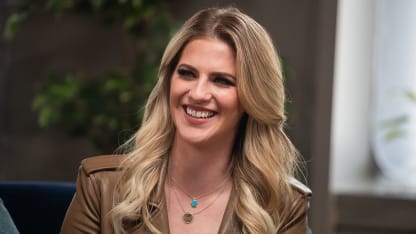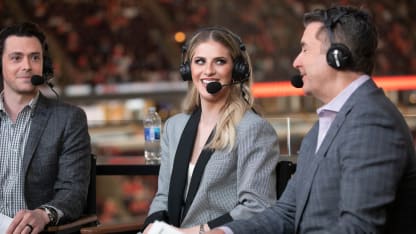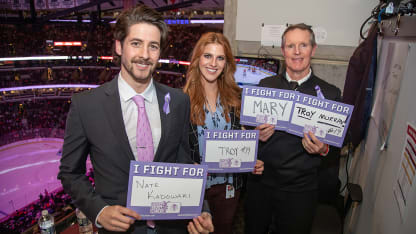In NHL.com's Q&A feature called "Sitting Down with …" we talk to key figures in the game, gaining insight into their lives on and off the ice. Today, we feature Caley Chelios, radio broadcaster and studio analyst for the Chicago Blackhawks.
Chelios talks balancing motherhood, broadcast career in Q&A with NHL.com
Blackhawks studio analyst also discusses learning hockey from father, Hall-of-Fame defenseman

© CHASE AGNELLO-DEAN
Caley Chelios was thinking more about being a mom than being a broadcaster after having her second child, a son, in the fall of 2021.
"I didn't have plans necessarily of having a job again before hearing from the Blackhawks," she said. "So, it was a great opportunity last season. But now after signing a two-year contract and knowing exactly what I'll be doing, it's been really fun. I'm really enjoying it and I feel the environment is exciting because there's just so much more direction as to where the team's going, expectations how to broadcast it."
Chelios, the daughter of former NHL defenseman and Hockey Hall of Famer Chris Chelios, is balanmcing work with being a wife and mom to Bella, who is 2 1/2 years old, and Danny, who's 1 1/2.
A reporter/radio broadcaster for the Tampa Bay Lightning from 2016-21, Chelios talks about what got her into the business, wearing many hats and the potential future of more women broadcasting in the NHL in a Q&A with NHL.com.
Did you always want to get into broadcasting?
"I actually didn't. I wish when I was younger that I had a bit more direction and certainty in what I wanted to do for a job after college. But I think in the back of my head, I just thought, 'It's fine. I'm always going to be in sports. I'll do hockey.' And when sports ended for me in college, I played my last lacrosse game I was like, I don't know how I can ever leave, you know?
"I had a job opportunity in finance right after school. My dad was like, 'Why don't you do broadcast?' I always loved watching Kathryn Tappen on NBC Sports and I watched the Hawks obviously through their dynasty era here, going to school at Northwestern. She was someone who stood out to me, but I never really knew what it would take to pursue a job in broadcasting. So, I decided instead of taking the finance job my senior year to go to graduate school at Northwestern and kind of see where I was and if I could do broadcasting. It was pretty rough coming out of that first year of school. It was a little overwhelming, but I knew I loved hockey more than anything and I knew I trusted my instincts a lot as far as wanting to talk about the game and I didn't feel that way really for any other sport. I was really happy to be a reporter in any other sport, but I knew I wanted to do hockey and I knew I wanted to do more than sideline or rink side. But there weren't any females in lead roles in the booth, so that wasn't a thought in my head at the time of school. It kind of all started to come to fruition when I took a chance and went to school for a year, hoping that would inspire me to want to do it and get some confidence. My first job at Tampa bay really opened the doors and gave me so much more direction and ambition as to what I wanted to accomplish."

Guessing a lot of that comfort with hockey comes from your upbringing?
"Oh, definitely. My brothers played at AAA, high school and went on to play juniors and at the college level. In college, my sister and I could drive to East Lansing [Michigan] from Evanston to watch their games on the weekends. I feel like a lot of my instincts come from just watching my dad watch games and watch my brothers growing up. [My dad] would coach [my brothers] to have conversations after every single game, where you're supposed to be, everything, whether they wanted to hear it or not. He was there, and he wanted to help as much as possible. For me, it helped shape my mind, too. I would say things during a game and it was wrong, so he would correct me and tell me what I'm seeing and not seeing.
"I never thought about it from the perspective of being a broadcaster because I didn't have that much direction on what am I going to do after school until after school happened. But I do think all that stuff gave me so much confidence. Even if I need to work on my on-camera skills, which I certainly did after school, I trusted that I understood and saw plays unfolded and I could get a good read on the type of player I was watching, whether it's their skill, their speed, their hockey IQ. I tested it, too. I'd watch games and I would talk to whoever, my dad, his teammates, anybody I was around, and I would bounce what I was thinking with what they were thinking, see if it aligns. It just gave me more confidence, the way I went through it."
What are some of your best memories in your time with the Lightning?
"It's hard to pinpoint favorite memories. I had an extremely close group of friends and colleagues that made it easy every day to go to work. But obviously covering two Stanley Cup Finals, albeit one was during COVID from the bubble, working with my daughter who was born in April 2020. That was pretty exciting for me. I was nursing and the first series game against Columbus went to five overtimes in 2020. We were all working from home and I was doing the radio during intermissions, watching the game on a laptop for five or six hours straight and nursing in between. I never would have imagined that would be my Stanley Cup Final in a million years, from my in-laws house where we drove down to after having my daughter. So, that was one of the more exciting ones.
"Obviously 2021 was awesome, too, because I got to in person for the first time when I was pregnant with my second [child] and cover the Final and be at the game when they won in Tampa Bay. That was incredible and that was the last time in was in Tampa to do a game. I pretty much got to say hi and bye and celebrate on a high note with all my colleagues, which was great. Those are probably two of the best as far as career moments. While I was with Tampa doing radio with Dave Mishkin, I officially broadcast in every NHL rink, including the [Nassau] Coliseum, in my two years with him. I thought that was pretty amazing, too. We went to Sweden for the 2019 Global series, and doing all that while pregnant, too, was pretty surreal."
How do you try to balance between family and broadcasting?
"I still ask people how to do it. I don't think there's a clear-cut answer, it's always going to be a work in progress. Every time you think you've got it, the kids evolve and take it to the next level. There's not a balance, necessarily, but it's just prioritizing what you can do when you can do it.
"Ultimately it comes down to communication. I love to be working and putting everything I can into my job, and that was my dream in 2019 in Tampa before I got pregnant. So, having kids has been the best experience ever, I can't imagine my life without them, but there's a lot more pull. I have to be present and spend time meal prepping, the food and the diapers, everything. There's a lot of mom guilt. It's getting a lot better and my husband's been incredible, but there's still that pressure of the primary parent where the mom is still responsible for the kids first. There's just the challenge of, no matter what, I need to make sure things are done. You just instinctually feel it all falls on you.
"My husband (former NFL running back Danny Vitale) and I both had stay-at-home moms. Danny's mom worked nights as a nurse as well, but for the most part they were solely responsible for all the things around the house. You just naturally gravitate toward that, but fortunately I think people are trying to make the working environment as supportive as possible for working moms. That means partners have to share that responsibility of being the so-called primary parent. Without that, I would definitely struggle more. There's just not enough time in the day to be the perfect wife, the perfect mom and then the perfect ambitious career woman at the same time.
"I think I had a very hard time with it my first year, transitioning and not being able to put 100 percent effort into my work. Now having kids has made me take a step back and recognize the importance and appreciation of those little moments with your family and not to take them for granted. So, I'm OK sometimes with missing a late game that I wanted to watch on TV if it means I got to read stories and put my daughter to bed."

We're seeing more women in broadcasting and NHL teams hiring them in front-office positions. Do you feel women are finally getting somewhere in the NHL?
"I do. I was taken aback even when I first wanted to do color on radio and do development camps and prospect camps. I was very surprised at how supportive everybody was of that, from my boss to my partner in Tampa. That took me by surprise because there were no females at the time doing it. There were women who had done it; it was just hard to sustain it, hard to find those jobs. It's not like I got paid more for doing it, so it was great to have the opportunity there. It's crazy. That was the first time I felt like, 'Wow, there needed to be a lot done before me to have that opportunity in the first place.'
"Then I heard AJ Mleczko do a playoff game in the Stanley Cup Playoffs in 2018 and I was taken aback by that. I thought, 'Wow, that's so cool, I've never heard a female's voice during a game in that sense.' So, I do think we're at a point where it's a lot more normal. It's still going to be hard like anything and still probably going to take some getting used to because traditionally, there aren't women n analyst role. It's always a former player, which makes sense, and there should be that element, for sure. But it's still cool you can have different people in there. it can be entertaining. There's still the aspect of, it's a game and it has to be entertaining, no matter what your background is.
"I think we're getting there. That line in the women's bathroom [in the press box] last year always sticks out as one of the funniest moments. For the first time there was a line at the [United Center] for women and we were all really proud in line. Now there are young girls interested in being in lead [broadcasting] roles, which I've never seen. I can just imagine in another few years how they're going to sound because they've been practicing and doing it since they were teen-agers. I was 26 or 27 and I didn't consider that was a possibility until after I heard AJ. It's really cool to see young girls seeing more people in lead roles and on top of their game and wanting to do it."

















